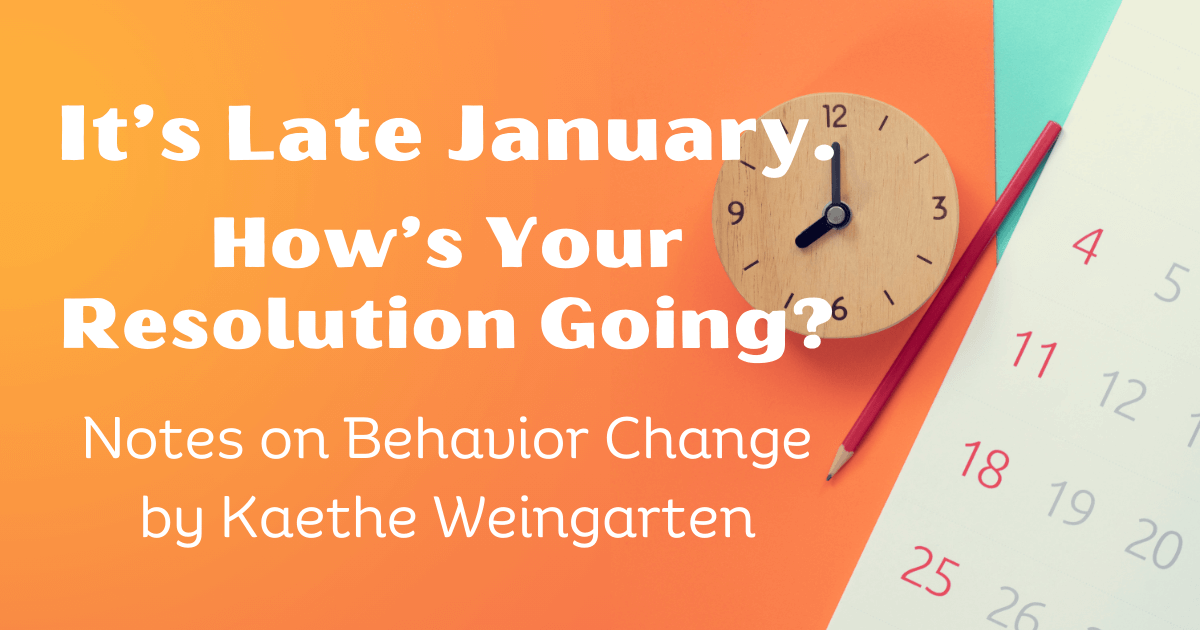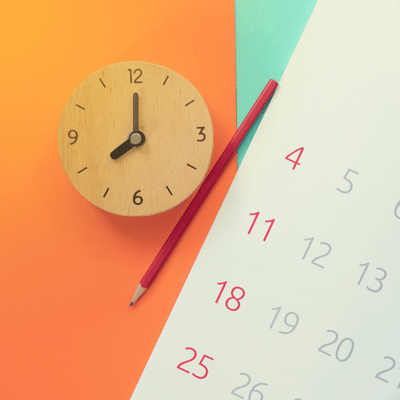It’s Late January. How’s Your Resolution Going? Notes on Behavior Change by Kaethe Weingarten

January is a month of beginnings, starting with the first of the year, the day more often than any other that people in the United States make resolutions to do -- or not do -- an activity. There is some instinct or intuition or learned response to the beginning of a year, month, week, or even day that mobilizes people to want to make a change. I am 77, and were I superstitious, given the doubling of 7, which many people believe is a lucky number, I might think it an auspicious year to make bets or a resolution this year.
The data, however, tell a different story with regard to resolutions. Although more than a third of people make a New Year’s resolution and a whopping 87% are optimistic that they will keep it throughout the year, in fact, only 1% do. The average length of maintaining a commitment that has been set is a little less than four months. This is such a common event that other days of the year have been designated as “quitters’ day” and “recommitment day.”
One point about a resolution seems obvious but bears being made explicit. If we set a resolution, it means we know that doing something or not doing something would be better for us. If we believe this, why is it so hard to follow through? One reason, social scientists offer, is that we mistakenly believe that follow through requires willpower and we all know that willpower can be hard to maintain. So, when we fail to meet the expectations we have set for ourselves, we aren’t surprised. Instead, we confirm what we think we already know: We just don’t have enough willpower to sustain what we have resolved.
There is a body of research, however, that suggests that it isn’t willpower that converts our intentions to habits but rather it is our ability to modify the cues in our external environment so that these cues support what we want to accomplish. Wendy Wood is a psychologist who has been studying habit formation for three decades. She has found that people are more likely to form habits if the cues that exist -- or that they arrange -- support those habits and if there is an immediate reward attached to the habit – whether it’s doing something or not doing something. Importantly, her team has found that the reward has to be immediate if it is going to reinforce the desired behavior. This is because when you are rewarded, the brain releases the neurochemical dopamine, creating a connection between the behavior and the reward, but dopamine only lasts for about a minute. So if you want the added boost of sensing a reward for your behavior, you have to provide the reward immediately.
Many of us don’t pay attention to the necessity of providing an immediate reward to ourselves when we are trying to form a new habit. According to Wood, it takes about three months of immediately rewarding a new behavior for the behavior to stick and become the habit we want. It is not a coincidence then that three months is also when most people have given up their resolutions!
A few years back, the physician Jerome Groopman wrote about Wendy Wood’s work and used as an example of changing a habit how he handled his smartphone. Perhaps because we are of the same generation, one of his resolutions is one of mine: placing his smartphone out of reach while he is driving. His reward is also the one I am using: turning on the music I enjoy during my ride.
I am writing this blog on January 1, on Day 1 of this resolution. When you read this, it will be one month and I will have written an addendum to the blog. I’ll be letting you know if the reward I have given myself and the manipulation of my environmental cues has been enough to sustain this new habit for four weeks! (Of course, knowing I have to make this reveal is undoubtedly part of the environmental cues I am manipulating since I would prefer to reveal I succeeded at maintaining my new habit than that I failed!)
In the meantime, I am also interested in how else I can think about a new habit. The word “new,” as in a new habit, slightly intimidates me. “New” implies “out of the blue” to me, or “without precedent.” And yet, it’s hard for me to imagine that something I want to add -- or stop -- to my behavioral repertoire could be so new that nothing has paved or prepared the way for it. When I try on the word “beginning,” it fits better, and I feel more confident I can do it.
John O’Donohue was an Irish poet and philosopher, who has a poem about beginnings that expresses my thinking about them. In one line he writes, “This beginning has been quietly forming,” which seems to me to be true about almost any beginning. Don’t we arrive at any point in time, space, or our imagination with everything that has come before? What if we thought of a beginning as an opening to what we desire or hope for? Then, perhaps, the question is, of all that we have done before and that has gone before, what do we carry with us to help make this beginning what we want? Or, as O’Donohue writes in prose, “A beginning is ultimately an invitation to open toward the gifts and growth that are stored up for us.”
Erica Peng, a leadership coach who teaches at the Haas School of Business at the University of California, Berkeley, has a wonderful set of reflection questions that take this same approach to the question of beginnings. In a set of paired questions she poses:
- What are 3 habits or behaviors you want to stop doing?
- What practices or activities fill you with joy and aliveness that you want to do more of?
This pairing makes vivid that a resolution can be a commitment to strengthen what we are already doing. A resolution can express a realization that we want to do more of what makes us feel alive and less of what deadens us. All of her questions are worth attention, especially if we are interested in thinking about January as a beginning.
I have written this blog as if I am addressing a solo person, but most of us are connected to others who are also setting intentions or making resolutions and stumbling to keep them. We can connect with others to help us and to help them. These are some questions that might be part of a dialogue, with a family member, a friend, a colleague or a patient:
- What are the cues I/you can shift to support a new behavior?
- What would be an immediate reward if I/you were to do this desired behavior?
- What has prepared the way for my/your intention to make this change?
- How does this resolution fit with clear commitments I /you have about how I/you want to live my/your life?
- How will my/your life be better if we can hold to our resolution? Visualize the difference.
- Can I/you commit to being patient should we “mess up” on any day and agree to just try again?
It is now the end of the month and I have learned a few things. I was mostly able to keep my resolution not to use the phone at all while driving. On days I forgot to set up the audio I wanted, I could feel the temptation but I did resist. This was partly because of the added incentive of knowing I would be writing this final paragraph but mostly due to new information I learned during the month. By coincidence, I read two articles that lent support to my resolution. I learned that even hands-free phone users are distracted drivers and that smartphone use seems to be causal in the significant increase in pedestrian deaths in the US. No short-term convenience to me is worth the risk.
Finally, in full disclosure, I made other resolutions as well, as a kind of controlled experiment to see how well I would do with those if there was no public reveal at the end of 28 days. I did pretty well, using the ideas of “mostly” and “ish” and “OK-enough.” I mostly did what I resolved to do every day-ish and this framing helped me continue on despite not fulfilling the letter of my intention. I also read these lines in a lovely piece by Rebecca Solnit: “We need stories in which getting where you’re going—individually or as a society—mostly happens step by step with maybe some backsliding, muddle, and stalling, not via one great leap.” A resolution is a kind of leap and I found I was OK-enough with some backsliding, muddle, and stalling. Now let’s see what happens next month!
- Log in to post comments

